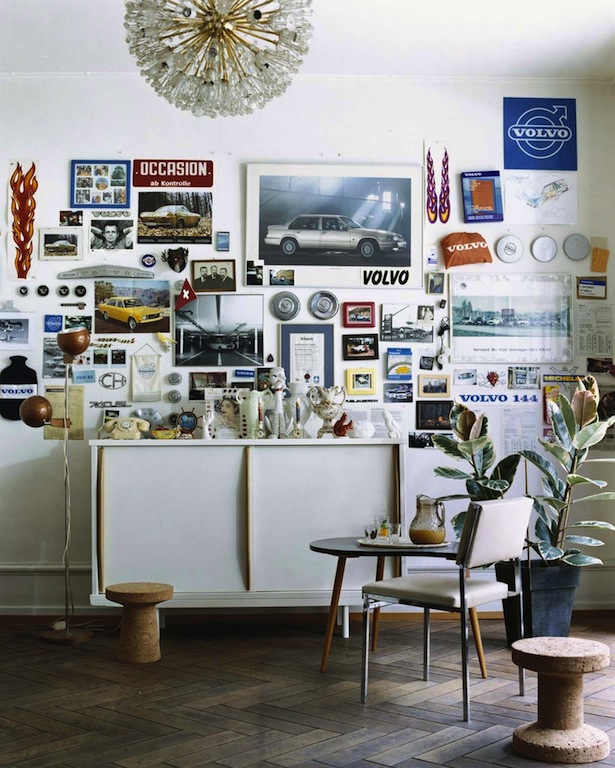
Domestic interior by Nicole Bachmann from Vitra’s Select, arrange catalogue, 2005
The subject of this photo probably isn’t what you assume it to be. It looks like it was taken because the wall of objects fascinated the photographer. The owner of this memorabilia loves Volvo cars and most likely drives one. Perhaps he—that seems a reasonable assumption here—works for Volvo. The assemblage radiates a delightful sense of history, both public and personal. This is a preoccupation that has clearly lasted for years, and it’s important enough to dominate the living area.
The picture by Nicole Bachmann, a Swiss photographer, appeared in a highly original furniture catalogue titled Select, arrange published in 2005 by Vitra. Furniture is its real subject: the white Bahut sideboard (1951) by Jean Prouvé, a self-taught French designer, and the cork stools or side tables (2004) by Jasper Morrison, a British designer famed for his restraint. These costly products feel almost incidental to the image. A parade of kitsch ornaments, possibly belonging to another occupant, covers the sideboard, and other items stand in the way, preventing a clear view of its lines. The stools blend unassumingly into the homely clutter of the scene.
Bachmann was one of several photographers commissioned by Cornel Windlin, deviser of the catalogue concept. The pictures treat Vitra’s products not as purified luxury items for the indulgence of the rich, but as ordinary objects to be lived with in a happy jumble alongside an assortment of other possessions. In a statement at the back, Morrison repudiates the idea of “perfect room sets for perfect people”—the standard, desiccated method of photographing and promoting high-quality design. Who really wants to live as though they were locked up in a showroom? In Morrison’s view, “A good environment is probably the result of a slow accumulation of things which you like, chosen for good reasons.” This is what we are offered in the picture.
Or are we? Despite its air of stumbled-upon informality, this isn’t a documentary image left entirely to chance. A professional stylist, Connie Hüsser, worked with the photographer, researching locations and finessing the interiors. The pictures imply that the Vitra products were recorded much as they happened to be found in people’s homes, but in some cases the pieces were brought in as props and put into the environments; here it may be the cork stools.
Knowing this makes surprisingly little difference to the seductive visual rhetoric, and even at the risk of demystifying the brand, the images succeed in integrating Vitra accessories into the haphazard fabric of domestic experience. Bachmann’s picture marks a tactical marketing shift by the company at a time when “high design” was looking increasingly dubious, away from design on a pedestal, preserve of a gilded elite, to the appearance, at least, of an easy-going design for everyday life.
See all Exposure columns
